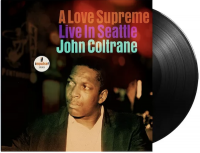John Coltrane A Love Supreme Live In Seattle
Porter writes “He (Coltrane) starts with the fanfare in E (described in Ashley Kahn’s notes as a ‘beautific benediction’), and the two bassists play together freely—the bowing appears to be (Donald Rafael) Garrett , and the pizzicato Garrison. Then, at 1:20 someone—certainly John—sets the tempo on cowbell and Elvin joins in. Garrison starts the famous main riff in F at 2:08. McCoy enters next.”
The performance and the recording begin auspiciously and the balance seems good but when Elvin Jones gets going, the two-microphone set up takes it from heaven to hell, or as mastering engineer Kevin Reeves puts it in a most understated way in his notes “….making for a very effective, balanced stereo image, even with a lot of bleed between the two channels. Elvin Jones, of course, is a major presence on both.”
In the opening “Acknowledgement” Jones dominates the sound to where Coltrane is left in the sonic dust as almost an afterthought. I wish it were otherwise but that’s how it is. If you can deal with the group leader/star attraction’s essentially off-mic performance there’s a great deal to like here, especially in the opening and very familiar “Acknowledgement”, energizing to hear live this way, but that’s still a big “if”.
Joining the “Classic Quartet” in this unusual performance of the near sacred in a profane club setting called The Penthouse, modeled after a Playboy Club featuring attractive young leotard-wearing women minus the bunny ears and tails, were new band members Pharoah Sanders and the aforementioned bassist Garrett, with alto saxophonist Carlos Ward guesting for this performance only. Despite three new group members, there had been no rehearsals and there are places where Coltrane can be heard coaxing things back together, which adds a bit of drama to what is already a high energy musical spectacle.
The performance ran twice the length of the studio version and includes four short interludes that produce peace amidst the near chaotic fury. On “Persuance”, Tyner use the extended time to riff a bit on “Giant Steps” and does some dazzling things with his right hand while Jones fortunately lays back enough to allow the piano to penetrate the space.
Just as the amateur recordist musician Joe Brazil had to flip the tape over at one point (the Ampex was a ¼ track machine), vinyl buyers will be flipping three times and find sides ending in fades that kind of break up the flow.
However, the vinyl version sounds so much more like you are in the club than does the streamed 192/24 bit MQA version (or the non MQA version) it’s well worth the effort assuming you can deal with the Elvin Jones dominant mix. The crack of Elvin’s kit presented in a transparent stereo mix alone almost makes this worth getting. Emphasis on almost.
You’ll wish the musicians could have been placed on the stage to produce a great recorded blend but that’s really asking for too much. As the notes describe, they were too far into their musical and spiritual world to care much about microphones or what the audience was experiencing. Excellent musical and historical annotation add to the physical package’s value as does the clean, quiet double 180g Optimal pressing quality.




